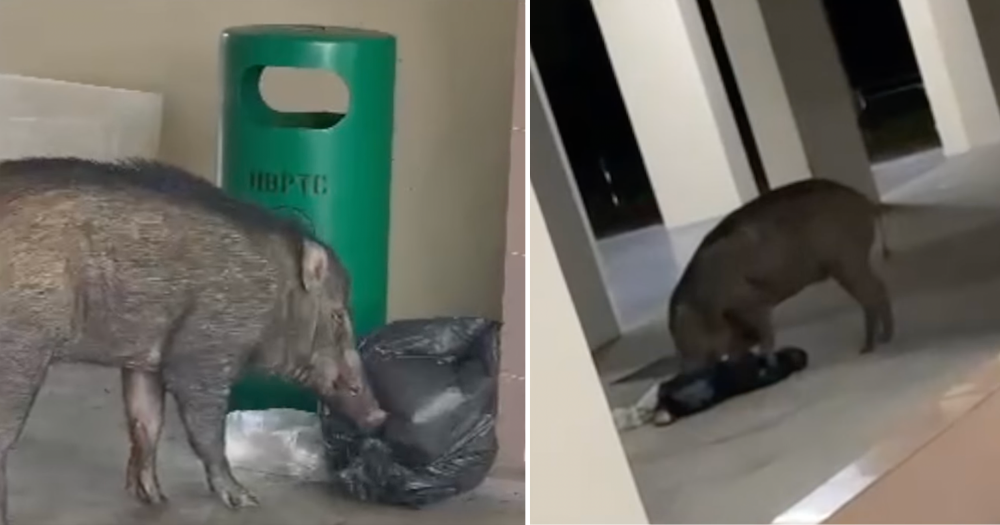ACRES is urging the authorities to implement better waste management practices after a wild boar was sighted rummaging through trash at Petir Road in Bukit Panjang.
This is to prevent more wild boars from experiencing conflict with people in urban areas, and subsequently being euthanised.
Boars feeding from rubbish bins
In its Facebook post on Feb. 14, the wildlife rescue organisation cited two similar incidents that had taken place in Choa Chu Kang.
Wild boars had ventured into the residential area to look for food as the rubbish bins were overflowing. Additionally, residents were apparently feeding the boars.
Subsequent complaints about the two boars led to their capture and execution, ACRES stated in its post.
Speaking to Mothership, ACRES co-CEO Anbarasi Boopal (also known as Anbu), shared that these two incidents took place in 2021.
Although the town council had made efforts to clean up the waste, the wild boars had already been "conditioned" to these alternative food sources.
As such, it started wandering near schools, which could have led to concerns from residents about public safety, Anbu said.
Anbu revealed that the first boar was captured in June 2021, and the second boar in September 2021.
More preventive measures like installing fencing
ACRES only found out that the wild boars were euthanised after they were put down, when they appealed to MINDEF to fence up the area in order to reduce the chances of wild boars leaving their natural habitat, and to the town council to improve food waste disposal.
According to Anbu, there is currently no relocation programme for wild boars.
Furthermore, capture and relocation is stressful on prey animals such as wild boars.
Considering the recent sightings of the wild boar at a HDB along Petir Road, ACRES is taking this opportunity to advocate for more preventive measures in order to minimise the possibility of relocating and euthanising wild boars.
Anbu said of the Choa Chu Kang incidents:"We strongly believe that that scenario could have been prevented if:
- The habitat on the other side of Choa Chu Kang Way was fenced up, preventing the pigs from crossing in the first place.
- If in the initial stages itself, the pig's food sources (including human feeding) were removed/ reduced so as to not attract more in the future."
As the parks and park connectors are adjacent to HDB estates along Petir Road, wild boars are more likely to enter urban areas.
ACRES said it believes that installing fences around forested areas would be beneficial and can reduce the occurrence of human-wildlife conflict.
As the National Parks Board (NParks) is involved in euthanising the wild boars, Mothership has reached out to NParks for comment, and will update this article when they reply.
What to do if you encounter wild boars
If you spot a wild boar nearby, here are some things to take note of, according to the NParks' advisory:
- Be calm and move slowly away from the animal. Do not approach or attempt to feed the animal.
- Keep a safe distance and do not corner or provoke the animal i.e. by using a flash while taking pictures of it.
- If you see adults with young piglets, leave them alone. These are potentially more dangerous because they may attempt to defend their young.
Don't feed wildlife
Under the Wildlife Act, feeding of wildlife is strictly prohibited without the Director-General’s approval, according to NParks.
First-time offenders caught feeding wildlife can be fined up to S$5,000, and repeat offenders can be fined up to S$10,000.
NParks has also previously advised members of the public against feeding wildlife, such as wild boars, as doing so could have an adverse effect on the animal population and balance of the ecosystem.
This is because feeding alters the natural behaviour of wildlife, making them reliant on humans for food.
This may subsequently lead to wildlife displaying more aggressive behaviour towards humans, and venturing further into roads and urban areas, which could be potentially dangerous for themselves and members of the public.
Related stories
Top photo from ACRES / FB
If you like what you read, follow us on Facebook, Instagram, Twitter and Telegram to get the latest updates.
